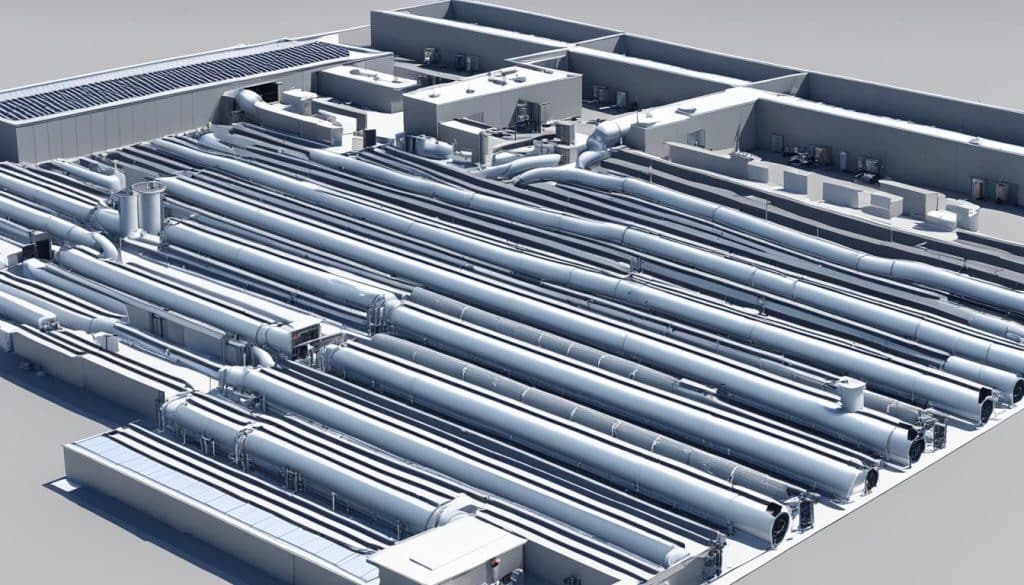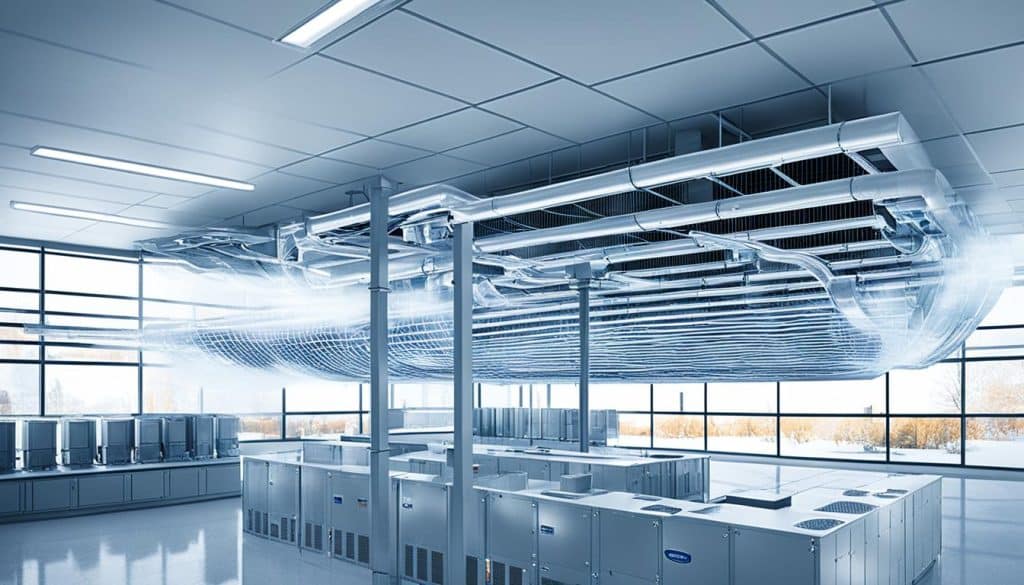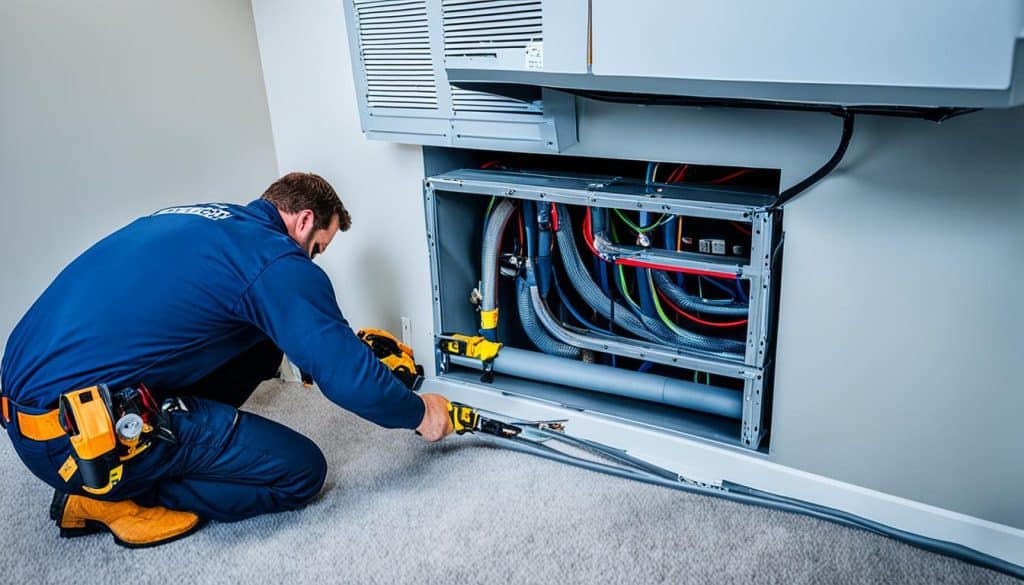Ever wondered how a simple box on your wall can make a room feel like the Arctic? The magic of air conditioning has changed our lives. But how much do you know about these cooling wonders? Here is the Cool Comfort: Your Air Conditioner System Guide for you.
Air conditioner systems are key to our comfort. They work quietly to keep the air clean and at the perfect temperature. Since Willis Carrier invented them in 1902, these systems have changed industries and homes. Today, they are advanced, managing heat and humidity to make indoor spaces perfect.
There are many types of air conditioning, from central systems to portable units. Knowing how they work helps you choose the right one for your home. This ensures you stay comfortable for years.
Key Takeaways
- Air conditioner systems regulate temperature and indoor air quality
- Willis Carrier invented modern air conditioning in 1902
- HVAC systems remove heat and humidity from indoor spaces
- Cooling units use refrigerant to absorb and release heat
- Various types of air conditioners suit different needs and spaces
- Understanding AC basics helps in making informed cooling decisions
Table of Contents
Understanding Air Conditioning Basics
Air conditioning systems keep us cool during hot summer months. They work by removing heat from the air. This helps you stay comfortable at home.
How an Air Conditioner Works
An air conditioner cools your home by moving refrigerant through a closed system. This process uses evaporation and condensation to remove heat. Your thermostat controls the system to keep your home at the right temperature.
Key Components of an AC System
The main parts of an air conditioner are the compressor, condenser coil, and evaporator coil. These parts work together to cool your home. Keeping them in good shape with regular maintenance helps your system last longer.
The Role of Refrigerants
Refrigerants are special fluids that change easily from liquid to gas. This lets them absorb and release heat well. Modern AC systems use refrigerants that are good for the environment.
Knowing how air conditioners work helps you take care of yours. It lets you schedule maintenance and know when to call for repairs. This keeps your home cool and comfortable.
Types of Air Conditioner Systems
Choosing the right air conditioner system is key to your home’s comfort and saving on energy bills. Let’s look at the main types of AC systems for cooling your home.
Central Air Conditioning Systems
Central AC systems are perfect for bigger homes. They use ducts to spread cool air everywhere. The setup includes an outdoor unit and indoor air handlers connected to it. This system cools the whole house and can save energy if sized right.
Ductless Mini-Split Systems
Ductless mini-splits work well in homes without ducts. They have an outdoor unit and one or more indoor air handlers. These systems are flexible and let you cool specific areas. They’re more efficient and easier to install because they don’t use ducts.
Window Units and Portable ACs
Window units and portable air conditioners are great for cooling single rooms or small areas. They’re simple to set up and don’t need professional help. Though not as efficient as central systems, they’re a budget-friendly option for small spaces or apartments.
When picking an AC system, think about your home’s size, setup, and local climate. Each type has its benefits and drawbacks in cost, energy use, and cooling power. Pick the right one for comfort and to save on energy bills.
Choosing the Right Air Conditioner for Your Home
Finding the perfect cooling unit for your home requires careful thought. The size of your living area is key in picking the right HVAC system. A good rule is to have 15 to 25 BTUs of cooling power for every square foot.
Also, think about your budget. It might be tempting to choose a cheaper model, but a high-efficiency air conditioner can save you money on bills over time. Look for units with high SEER ratings for the best energy use.
Consider your home’s ductwork when deciding between central air and ductless mini-splits. If your house doesn’t have ducts, a ductless system could be a better choice and save you money.
Other things that affect your cooling needs include ceiling height, window count, insulation quality, and how much sun your home gets. These can change how big your air conditioner should be. To make sure you get the right unit, talk to a professional HVAC expert for advice tailored to your home.
Air Conditioner System Installation and Costs
Installing an AC is key to keeping your home cool and comfy. The cost to put in a central air system in the Northwest varies from $5,000 to $10,000. The price depends on your home’s size and how hard the installation is.
Factors Affecting Installation Costs
The size of your AC, your home’s design, and if you have ducts already affect the cost. Bigger homes or those with tricky layouts cost more. If your home doesn’t have ducts, installing them will add to the price.
DIY vs. Professional Installation
Trying to install it yourself might save money, but it’s not always wise. Hiring certified pros for AC installation is better. They know how to set it up right for the best performance. They’re skilled in dealing with complex systems and ensure it follows local rules.
Energy Efficiency Considerations
Choosing an AC with high SEER ratings and ENERGY STAR certification is important. These efficient models cost more at first but save money on bills later. Keeping your HVAC in good shape also helps it work better and last longer.
Maintaining Your Air Conditioner System
Regular HVAC maintenance keeps your air conditioner running well. It ensures your system works efficiently, saves energy, and improves the air you breathe. Taking good care of your AC also helps avoid expensive repairs later.
Changing air filters is easy but important. Clean filters improve airflow and catch dust and allergens. Try to change or clean your filters every 1-3 months, based on how much you use it and your environment.
Cleaning the condenser coils is also key. These coils get dirty over time and can slow down your system. Use a soft brush or vacuum to clean them and keep your AC running smoothly.
Checking refrigerant levels should be done by experts. If the levels are low, your AC might not cool well and could be damaged. If your AC is not cooling right, it’s time to get it fixed.
Looking at electrical connections regularly can prevent sudden breakdowns. Bad connections can cause problems and be dangerous. A pro HVAC technician can check and fix these during routine visits.
Regular HVAC maintenance means better air quality, lower bills, and a longer-lasting AC. Think about getting professional check-ups twice a year to keep your AC running great.
Troubleshooting Common AC Issues
When your air conditioner acts up, it’s crucial to identify the problem quickly. Strange noises, uneven cooling, and inefficient operation are typical signs that your AC needs attention. Let’s explore these issues and learn when to seek professional help.
Strange Noises and Their Meanings
Unusual sounds from your AC can indicate various problems. Rattling or buzzing might point to loose parts, while hissing could suggest a refrigerant leak. These noises often require air conditioning repair by a trained technician to prevent further damage.
Dealing with Uneven Cooling
If some rooms are cooler than others, you may have blocked vents, dirty filters, or ductwork issues. Regular HVAC maintenance can prevent these problems. Check and clean your vents, replace filters, and consider a professional inspection of your ducts.
When to Call a Professional
While simple tasks like changing filters are DIY-friendly, complex issues need expert handling. If you notice persistent problems with your thermostat, strange odors, or significant temperature fluctuations, it’s time to call Platinum Heating & Cooling at (616) 229-0444. Their skilled technicians can diagnose and fix your AC troubles efficiently.
For new construction projects, we collaborate with contractors and builders. We design and install HVAC systems that fit the building’s needs. We consider size, occupancy, and energy efficiency to ensure comfort and savings. Dial (616) 229-0444 or email office@platinumheatingmi.com to plan your consultation. See the difference with Platinum Heating & Cooling and enjoy a cool environment.



